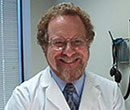The cold weather is beginning to settle in over the Hudson Valley. While frigid temperatures may be merely uncomfortable for most of us, the cold can be dangerous for people suffering from chronic obstructive pulmonary disease (COPD).
The two main conditions associated with COPD are emphysema and chronic bronchitis. “Both are caused, most frequently, by smoking, and therefore there are usually components of both diseases in smokers or former smokers,” says Dr. Alan H. Gross, a pulmonary specialist in Premier’s Internal Medicine Division. Frequent exposure to other irritants, such as chemical fumes and workplace dust can lead to COPD and, more rarely, so can genetics or uncontrolled long-standing asthma.
The shortness of breath, wheezing and coughing symptomatic of COPD are exacerbated by bronchial irritants, including cold air. The common cold and flu, which are more easily spread in winter, not only worsen COPD symptoms, they are also more likely to develop into serious infections in patients with COPD.
“To try to prevent worsening of COPD and pneumonia, vaccinations are useful,” Dr. Gross says. “A yearly flu shot is very important for patients with COPD, because the flu may cause not just flu but also pneumonia.”
Vaccination against pneumococcal pneumonia is also warranted, he says. There are actually two different vaccines, and both are very effective. “One vaccine targets 23 different strains of the pneumococcal bacteria,” he says. “The other, which is relatively new, targets 13 strains and is most often used in combination with the older vaccine.”
Unlike the flu vaccine, which changes every year to target the most likely strains of the ever-evolving virus that will be in circulation, vaccination against pneumonia is given just once or twice in one’s lifetime, typically after age 50. Dr. Gross recommends talking to your physician about which pneumonia vaccine to get, and when.
He also advises COPD patients to limit time outdoors during the region’s severe cold snaps and to be diligent in taking the medications prescribed to help control their COPD symptoms.
 Alan H. Gross, MD, FCCP is a board certified Pulmonary Specialist with Premier Medical Group’s Internal Medicine Division. To schedule an appointment with Dr. Gross please call 845.790.6100
Alan H. Gross, MD, FCCP is a board certified Pulmonary Specialist with Premier Medical Group’s Internal Medicine Division. To schedule an appointment with Dr. Gross please call 845.790.6100
